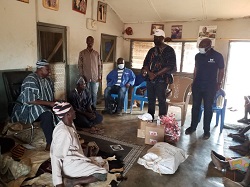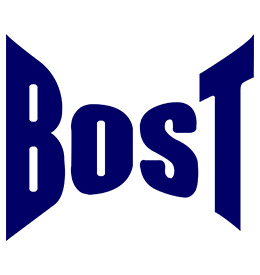 The Bulk Oil Storage and Transportation Company Limited, BOST is sensitive to its role as a corporate citizen. Among other things, the company devotes time and resources towards making lives better for people living in communities where BOST operations are located.
The Bulk Oil Storage and Transportation Company Limited, BOST is sensitive to its role as a corporate citizen. Among other things, the company devotes time and resources towards making lives better for people living in communities where BOST operations are located.
The Managing Director of BOST, Mr. Edwin Provencal and a team from the head office made up of Marlick Adjei, Head of Corporate Affairs, Nicholas Samari, Head of Assets and infrastructure and Eric Kuampah, Head of Operations at the Savelugu Booster Station in the months of June and November 2020 visited a total of 40 communities along the Buipe Bolgatanga Pipeline in the light of this key function of stakeholder engagement. The communities visited include:
- Buipe
- Yapei
- Fufulso
- Sawaba
- Kampong Yilli
- Zanzugu Yipala
- Kanshegu
- Savelugu
- Gushie
- Nabogu
- Nangbagu
- Laogri
- Nasia
- Diare
- Kukobilla
- Pigu
- Walewale
- Wulugu
- Gbimsi
- Posonamogo and
- Wikongo
Among other things, the team donated nose masks, veronica buckets and hand sanitizers to the chiefs and their people to protect them from the deadly COVID-19 disease. Undisclosed sums of money and hampers of assorted drinks were also donated to the chiefs as a token for their continuous support to the company by educating their people to stay away from the pipelines and ensure the asset and the lives of the people are mutually protected.
In his comments across the communities, Mr. Provencal urged the Chiefs and the people to take advantage of the Free Senior High School the government has introduced to ensure that poverty is defeated in line with the Sustainable Development Goals of the world. He further stressed that, even though the impact of COVID-19 is less in the northern regions, there is every need for the people to observe the protocols to ensure their health and safety to contribute effectively to the progress of the nation.
The Buipe-Bolgatanga Petroleum Product Pipeline, B2P3 is a 269 kilometer product pipeline completed in 2006 for the transfer of products between the Buipe and Bolgatanga depots to meet product demand in the northern regions and for the export market to our landlocked neighbors in the Sahel region.
Below are images of the BOST team interacting with the chiefs and people of the communities visited during the engagements
 .
.
BOST Staff led by its MD, Mr. Edwin Provencal (in smock) interacting with the Chief of Buipe in the Savannah Region

Some items donated to the people included some quantities of nose masks and hand sanitizers.
 The Managing Director of Bulk Oil Storage and Transportation (BOST) Company, Mr Edwin Alfred Provencal at the end-of-year media engagement has outlined some concerns of BOST which inure to the benefit of every Ghanaian when they are addressed.
The Managing Director of Bulk Oil Storage and Transportation (BOST) Company, Mr Edwin Alfred Provencal at the end-of-year media engagement has outlined some concerns of BOST which inure to the benefit of every Ghanaian when they are addressed.
According to him, every Ghanaian stands to benefit from the operations of BOST when the company is retooled with adequate support from the right shareholders to make its work become very effective.
In an interview with Peacefmonline.com, Mr Edwin Provencal said that the price build-up has transportation cost and so when BOST works very well, the transportation will be efficient and bring lower cost and lower taxes to the consumer.
He noted that BOST being a state agency can partner other agencies like Go Energy and GOIL to import products in volumes as they together carry about more than half of the market in the industry to impact positively on the taxpayer who buys fuel every day.
“When BOST works very well, BOST is a state agency and it can partner other agencies like Go Energy and Goil and together, we carry about more than half of the market in the industry. So when we come together and we import products, with those volumes, we will benefit from the economics of scales. Those economies of scales can eventually impact positively on the taxpayer who buys fuel every day,” he explained.
He further indicated that BOST will be able to achieve its mandate in terms of petroleum security when it works very well; thus, when the company has a lot of fuel in the system, whenever prices go up, BOST can still cushion the Ghanaian taxpayer.
“ . . when BOST works very well, our mandate in terms of petroleum security will be achieved. That means that we will have a lot of fuel in our system. If we have a lot of fuel being stored, at the juncture when prices go up we can still cushion the Ghanaian taxpayer. When prices go down, we can still reap the thing back because the market is that there are ups and downs. When BOST works very well, we will be able to cushion the taxpayer when prices go up,” he articulated.
Highlighting on the way forward to make BOST work effectively, the Managing Director of BOST said that the company needs the support of the right stakeholders, efficient regulation and access to funds to make the company work very well to inure to the benefit of the taxpayer.
“What we need to make BOST work very well is the support of the right stakeholders. It is true we got an increased in BOST margin, but the increase was not what we asked for. So, if we are to get to that point in 1 year, it will take us about 4 to 5 years to get to that point”.
“Another point is regulation; if we are regulated efficiently enough, we will get there quicker. Access to funds is another way to make BOST work very well. Access to funds is the function of so many things; it is the function of management capability, balance sheet, the trust the owners of surplus cash have for you; today, we are not there yet”.
“We are on a journey; we hope to get there quicker and if we get there quicker, we may have access to the right partners, the right institutions to give us the needed funds to grow this entity we call BOST. I believe within the next two to three years we should be there but we can get there faster,” he noted.
 The Bulk Oil Storage and Transportation Company Limited, BOST is sensitive to its role as a corporate citizen. Among other things, the company devotes time and resources towards making lives better for people living in communities where BOST operations are located.
The Bulk Oil Storage and Transportation Company Limited, BOST is sensitive to its role as a corporate citizen. Among other things, the company devotes time and resources towards making lives better for people living in communities where BOST operations are located.  .
.

 The Managing Director of Bulk Oil Storage and Transportation (BOST) Company, Mr Edwin Alfred Provencal at the end-of-year media engagement has outlined some concerns of BOST which inure to the benefit of every Ghanaian when they are addressed.
The Managing Director of Bulk Oil Storage and Transportation (BOST) Company, Mr Edwin Alfred Provencal at the end-of-year media engagement has outlined some concerns of BOST which inure to the benefit of every Ghanaian when they are addressed.
 1. Staff and Visitors should adhere to the Safety Protocols of the Company;
1. Staff and Visitors should adhere to the Safety Protocols of the Company; The National Petroleum Authority (NPA) has directed Oil Marketing Companies to increase the Bulk Oil Storage and Transport (BOST) margin on petroleum products by three pesewas to six pesewas effective June 1.
The National Petroleum Authority (NPA) has directed Oil Marketing Companies to increase the Bulk Oil Storage and Transport (BOST) margin on petroleum products by three pesewas to six pesewas effective June 1.




